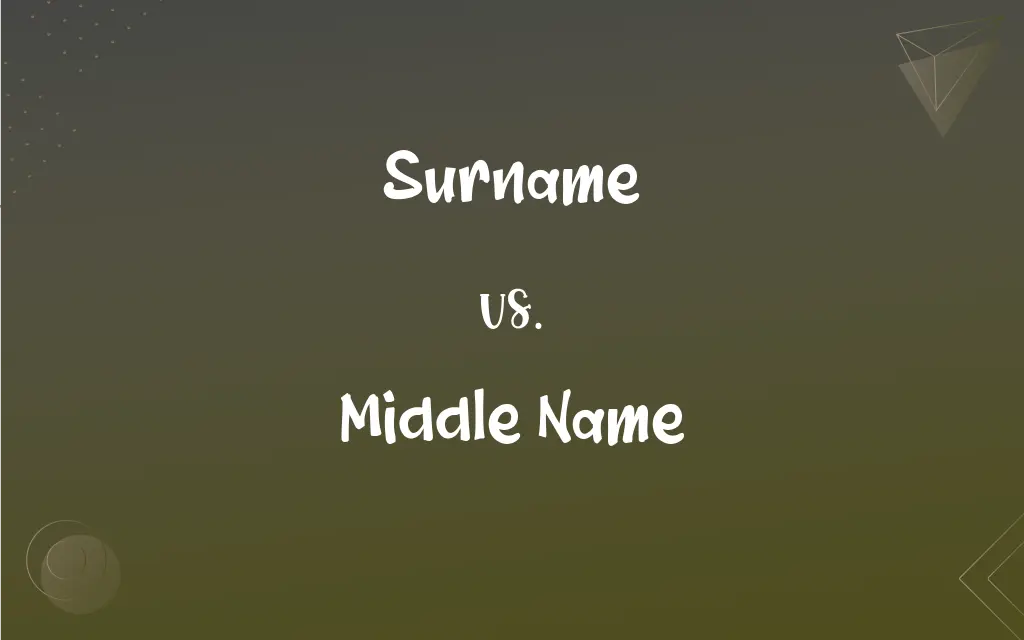Surname vs. Middle Name: What's the Difference?
Edited by Aimie Carlson || By Janet White || Published on December 1, 2023
A surname is a family name passed down generations, typically used as a last name, while a middle name is an additional personal name given at birth.

Key Differences
A surname, often referred to as a family name or last name, is a part of a personal name that is passed down from one generation to the next and is shared among family members. A middle name, on the other hand, is an additional name given to a person at birth, usually placed between the first name and the surname.
Surnames are used for familial identification and heritage, often indicating ancestral or clan affiliations, and are a key component in many cultures for recognizing family lineage. Middle names can serve various purposes, such as honoring a relative, preserving a mother's maiden name, or simply providing a unique personal identifier.
In many cultures, the surname is inherited from one's parents and is common within the family, establishing a connection to the family's history. The middle name, while also a part of one's legal identity, is more flexible in use and is not necessarily shared with other family members.
Legally, the surname is often more significant, as it appears on formal documents and is used in legal, professional, and official contexts. Middle names are sometimes omitted in formal settings and are often optional in day-to-day use.
The origin of surnames varies, often based on geographical, occupational, or ancestral aspects, while middle names can be derived from a wide range of inspirations, including personal preferences, names of influential figures, or other family names.
ADVERTISEMENT
Comparison Chart
Definition
Family name, typically used as a last name
Additional personal name given at birth
Purpose
Identifies familial heritage
Provides a unique personal identifier
Inheritance
Passed down through generations
Chosen by parents, not inherited
Legal Use
Used in all formal and legal documents
Often optional in formal documents
Origin
Often based on ancestry or geography
Can be inspired by various personal reasons
ADVERTISEMENT
Surname and Middle Name Definitions
Surname
The last part of a personal name, indicating family lineage.
In many cultures, children inherit their father's surname.
Middle Name
An additional name given to a person, placed between the first and last name.
Her middle name, Elizabeth, was chosen by her parents.
Surname
Common among members of the same family.
Everyone in her immediate family shared the same surname.
Middle Name
Often used to honor a relative or preserve a family tradition.
His middle name, Michael, was the same as his grandfather's.
Surname
Reflects ancestral or cultural heritage.
Her surname was of Italian origin, reflecting her family's heritage.
Middle Name
Optional in use and not always included in formal documents.
On official forms, he sometimes omits his middle name, Thomas.
Surname
Used for official purposes and formal identification.
His surname appeared on all his legal documents.
Middle Name
May carry personal or familial significance.
Her middle name was her mother's maiden name, preserving family history.
Surname
A family name passed down from one generation to another.
Her surname, Johnson, was a common name in the region.
Middle Name
Provides further personal identity beyond the first name.
She often went by her middle name, Grace, instead of her first name.
Surname
A name shared in common to identify the members of a family, as distinguished from each member's given name. Also called family name, last name.
Surname
A nickname or epithet added to a person's name.
FAQs
Can surnames change over time?
Yes, surnames can change due to marriage, adoption, or personal choice.
Do all cultures use surnames?
Most cultures do, but the format and placement can vary.
Is a surname always a family name?
Typically, yes, it represents the family lineage.
Is it common to have multiple middle names?
In some cultures, having multiple middle names is common.
Is the surname important for genealogy?
Yes, surnames are crucial in tracing family history and lineage.
Are middle names legally required?
No, middle names are optional and not legally required.
Can a middle name become a surname?
It's uncommon, but a middle name can be used as a surname in some instances.
Do siblings always share the same surname?
Generally, yes, except in cases of half-siblings, adoption, or name changes.
Can middle names be used daily?
Yes, some people choose to go by their middle names.
Can a middle name be a family name?
Yes, it can be a family name or any name chosen by parents.
Is it common to have no middle name?
Yes, not having a middle name is quite common in some cultures.
Can a middle name be a primary name?
Yes, some people prefer to use their middle name as their primary name.
Are surnames used professionally?
Yes, surnames are commonly used in professional contexts.
Can surnames indicate geographic origin?
Often, surnames can hint at geographical or ethnic origins.
Can surnames be hyphenated?
Yes, hyphenated surnames are common, especially in marriage.
Are surnames important for legal identity?
Absolutely, surnames are a key part of one’s legal identity.
Do middle names appear on passports?
Yes, middle names are usually included on passports.
Is it easy to change a middle name?
Changing a middle name can be done legally, similar to changing a first or last name.
Do legal documents require a surname?
Yes, surnames are typically required on legal documents.
Do middle names have cultural significance?
In some cultures, middle names carry significant meaning or traditions.
About Author
Written by
Janet WhiteJanet White has been an esteemed writer and blogger for Difference Wiki. Holding a Master's degree in Science and Medical Journalism from the prestigious Boston University, she has consistently demonstrated her expertise and passion for her field. When she's not immersed in her work, Janet relishes her time exercising, delving into a good book, and cherishing moments with friends and family.
Edited by
Aimie CarlsonAimie Carlson, holding a master's degree in English literature, is a fervent English language enthusiast. She lends her writing talents to Difference Wiki, a prominent website that specializes in comparisons, offering readers insightful analyses that both captivate and inform.






































































